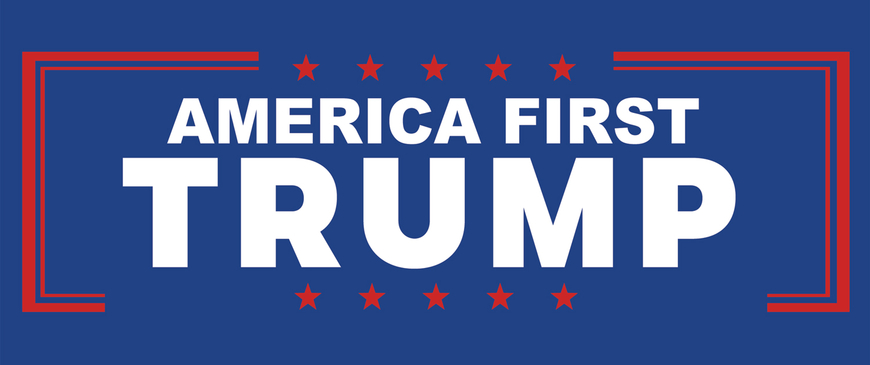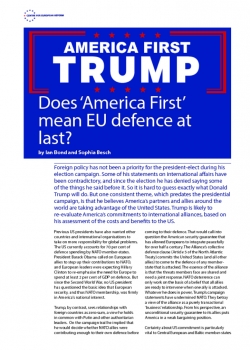
Does 'America First' mean EU defence at last?
The election of Donald Trump as the next president of the United States puts European security at risk.
Foreign policy has not been a priority for the president-elect during his election campaign. Some of his statements on international affairs have been contradictory, and since the election he has denied saying some of the things he said before it. So it is hard to guess exactly what Donald Trump will do. But one consistent theme, which predates the presidential campaign, is that he believes America’s partners and allies around the world are taking advantage of the United States. Trump is likely to re-evaluate America’s commitments to international alliances, based on his assessment of the costs and benefits to the US.
Previous US presidents have also wanted other countries and international organisations to take on more responsibility for global problems. The US currently accounts for 70 per cent of defence spending by NATO member-states. President Barack Obama called on European allies to step up their contributions to NATO, and European leaders were expecting Hillary Clinton to re-emphasise the need for Europe to spend at least 2 per cent of GDP on defence. But since the Second World War, no US president has questioned the basic idea that European security, and thus NATO membership, was firmly in America’s national interest.
Trump, by contrast, sees relationships with foreign countries as zero-sum, a view he holds in common with Putin and other authoritarian leaders. On the campaign trail he implied that he would decide whether NATO allies were contributing enough to their own defence before coming to their defence. That would call into question the American security guarantee that has allowed Europeans to integrate peacefully for over half a century. The Alliance’s collective defence clause (Article 5 of the North Atlantic Treaty) commits the United States (and all other allies) to come to the defence of any memberstate that is attacked. The essence of the alliance is that the threats members face are shared and need a joint response. NATO deterrence can only work on the basis of a belief that all allies are ready to intervene when one ally is attacked. Whatever he does in power, Trump’s campaign statements have undermined NATO. They betray a view of the alliance as a purely transactional ‘business’ relationship. From his perspective, an unconditional security guarantee to its allies puts America in a weak bargaining position.
Certainty about US commitment is particularly vital to Central European and Baltic member-states that feel threatened by a resurgent, expansionist Russia. They point to the comments of one of Trump’s campaign surrogates, former speaker of the House of Representatives Newt Gingrich, who described Estonia, a NATO ally, as “the suburbs of St Petersburg”, and questioned whether the US should risk nuclear war to defend it.
With #PresidentTrump Europeans can no longer take US’s security role on their continent for granted
With the election of Trump, Europeans can no longer take America’s security role on their continent for granted. They will have to make the case for European defence to the incoming US government anew. Leaders should formulate a united position while Trump’s policy on Europe is forming. They must show that they are doing more for Europe’s defence, and accept a greater share of the burden within the alliance. One obvious priority must be to further increase defence spending.
Europeans should also outline to the presidentelect the value of NATO to the United States. European allies have been America’s most important partners in working for global security. European troops have deployed alongside the Americans in Afghanistan, in Iraq and the Balkans. The only time that NATO invoked Article 5 in its 67-year history was in support of the United States after 9/11. Trump may also find that he needs the support of the alliance. As isolationist as some of his statements have been, he is committed to fighting Daesh. NATO helps with that: all member-states currently take part in the US-led coalition against Daesh, and NATO allies are planning a training and capacity building mission inside Iraq.
But Europe also needs mitigation strategies in case Trump really meant what he said during the campaign, and NATO is weakened as the principal security provider on the continent. Long-standing disappointment over the EU’s defence policy has in the past led some to proclaim that only an external shock could convince European leaders to ‘rally around the EU flag’ and get serious about defence. Could the election of Trump give European Union defence policy a new impetus?
Russia’s annexation of Ukraine, the refugee crisis and terrorist attacks on European soil have already brought security to the top of Europe’s agenda. In response, the EU this year adopted a new ‘Global Strategy’, outlining its foreign and security policy priorities. The document commits to the controversial concept of ‘strategic autonomy’, the ability to decide and implement EU security policy without relying on the United States. The Union is still far away from this goal. But Trump may make it more urgent for Europe to work towards stronger and better-integrated defence industries, invest in the development of military capabilities and build effective command and control structures.
After the inauguration of President Trump, European strategic autonomy will no longer be just about burden-sharing. It will also be about the EU being strong enough to decide independently not to follow the US at all costs. If a Trump administration decided (for example) that nuclear non-proliferation was no longer a US goal, then the EU would need to part company with Washington and ensure that it had the diplomatic, economic, security and intelligence tools to constrain and ideally prevent proliferation. If Trump rejected the agreement on Iran’s nuclear programme, as he has said he would, then the EU would still need to work with Russia and China to try to prevent Iran from rushing to develop a bomb.
The US election result also reinforces the imperative European leaders have faced since Brexit: they must demonstrate unity, and strengthen the tarnished credibility of the European Union. But while it would make sense for Europeans to co-ordinate their response to a Trump presidency in defence matters, unity is by no means predetermined. European integration has taken place under the watchful but generally supportive eye of the US.
One risk is that Europeans start a beauty contest, with individual leaders vying to show that they are on Trump’s side while others are not to be trusted. Populist and nationalist leaders, including Nigel Farage in the UK, Marine Le Pen in France and Prime Minister Viktor Orbán in Hungary, have already openly backed Trump. Instead, the EU must come together and show unity of purpose, particularly on security and defence. European leaders, especially Angela Merkel but in due course the next French president (unless it is Madame Le Pen), must demonstrate their firm commitment to European cohesion and continental security.
Ian Bond is director of foreign policy and Sophia Besch is a research fellow at the Centre for European Reform.

